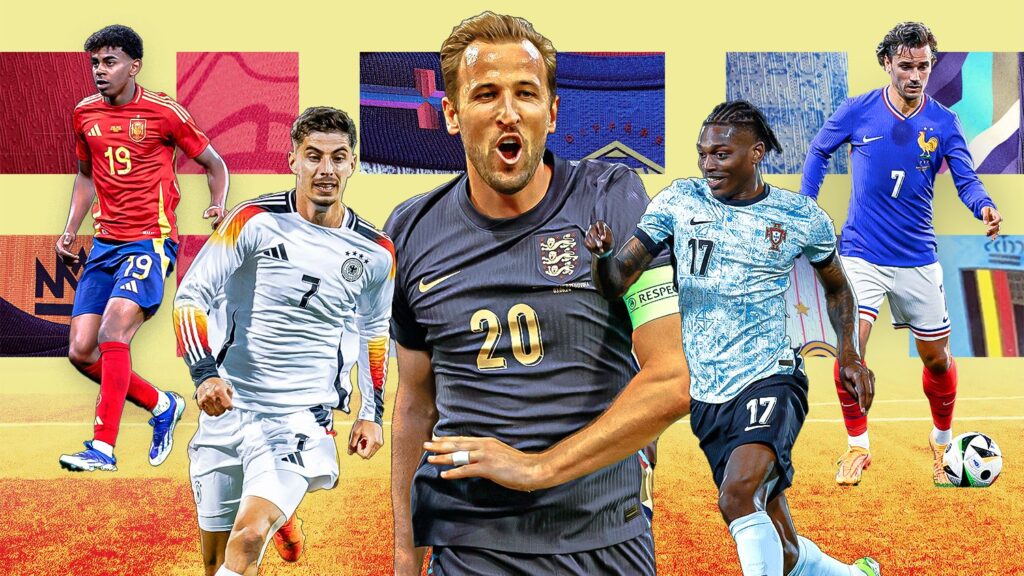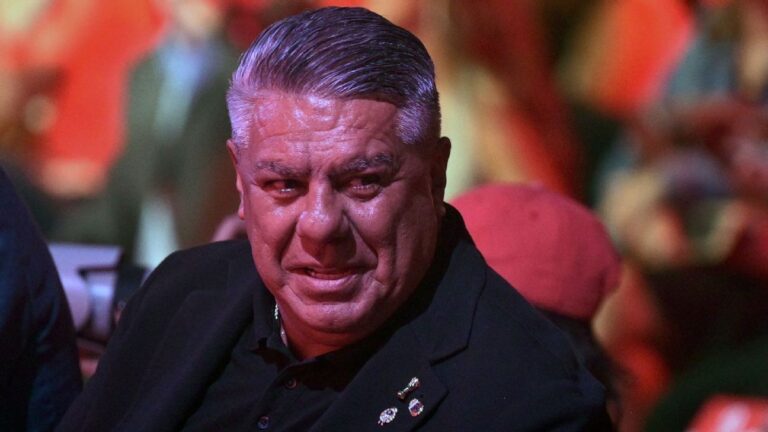We won’t know which team will lift the Henri Delaunay trophy as Euro 2024 winners until July 14, but we can already see which kits rule the continent!
There are 24 national teams competing in Germany over the next month, and that means there are potentially 48 jerseys that will be played in over the course of the next month.
Unsurprisingly the battle at the top of the ranking is between Adidas and Nike, but by no means do all of the kits produced by the major manufacturers hit the mark.
Fellow global heavyweight Puma also appears several times on the list along with Joma and Macron, while Danish sportswear brand Hummel is only outfitting one team at the tournament (can you guess which one?).
Which traditional powerhouse has shown they’ve still got what it takes in the style stakes, and which emerging nation can punch above their weight when it comes to their on-pitch outfits?
We have ranked every team from 24-1, taking both their official home and away shirts into account, to find out who has the best kits at Euro 2024.
Slovakia have been bequeathed a pair of utterly featureless home and away shirts that appear to be little more than standard Nike templates embellished with the logos of the national team and football federation.
It says a lot that the simple red front and underarm panels on the blue home jersey are enough to see it stand above the painfully basic all-white away kit.
Hopelessly predictable stuff from Turkey, whose fans have been saddled with near-identical kit configurations for almost a century. The only notable difference between their new home shirt and the 2023 edition is the removal of the thin red trim around the collar and cuffs — thus rendering it even plainer than its predecessor.
Of course, if Turkey’s home jersey is white then you can safely wager that the equivalent away kit will be red. In fact, in an impressive feat of creative reticence, it is somehow even more devoid of detail.
Ukraine will be taking to the pitch at Euro 2024 wearing the same Joma kits that they wore at Euro 2020, which were released ahead of the tournament in 2021. The home shirt is yellow with blue trim and carries a dotted outline of the country fused into the fabric.
The corresponding away jersey is exactly the same but with the two colours swapped around, and also with the logo of the Ukrainian Association of Football given pride of place in the centre of the shirt.
Albania’s national kits have remained largely unchanged for several years, and qualifying for Euro 2024 hasn’t led to anything special being produced. The home shirt is a deep-red base with black trim and a graphic on the front that consists of a deconstructed image of the federation’s eagle crest.
The away jersey is a direct colour swap, with the red base swapped to white, and looks more like the uniform for staff at a fast-food restaurant than a soccer jersey.
Georgia’s 2024 home shirt is white with a red vertical bar running centrally that appears to halt for the application of a front number. The body of the design also features a dotted pattern made up of the crosses found on the Georgian national flag, which is a nice touch amid a plethora of infinitely less interesting designs.
The shirt that manufacturer Macron has officially designated the away kit is the same fundamental design, this time in black with red trim. However, Georgia have not worn that since last October, and have often instead been wearing their all-red third alternate kit, including in the qualification playoff victory over Greece that sealed their first-ever place at a tournament finals.
Another national side who routinely stick to the “one white, one red” formula when it comes to their kits, Poland have drummed up a pair of largely featureless home and away jerseys using the two colours found on their national flag.
At least the away jersey boasts a tonal “digital dot” graphic that is relatively wild and experimental by their standards.
A straightforward design that presents the team’s national colours, although this time with a little more flair. The yellow home shirt features an unusual anticollar and the three primary colours of the flag are found banded around the sleeve cuff.
The away shirt sees the same palette jumbled up to create a predominantly red shirt fringed with the same tricolour trim.
The home shirt is a basic red template with blue-and-white trim that has been mottled by a vague ripple design inspired by the wings of an eagle in flight.
The knitted cuff bands of the away jersey boast a unique pattern inspired by the craggy red mountains and rugged rock formations found in Davolja Varos (Devil’s Town) in the south of the country.
One red. One white. However, the home shirt does have a barbed linear graphic inspired by the hand-stitching on traditional Swiss clothing to liven things up a little.
Along with dark blue trim, the white away shirt also has a pale, icy blue swirl across the body that is supposed to replicate the contour lines found on maps of the nation’s more mountainous regions. As the old joke goes, the Swiss flag is also a big plus.
The design of the home kit is a slightly modernised revamp of the Magyar’s traditional colours, and the red shirt furnished with standard white-and-green trim is one of the better versions of the Adidas template.
As you can probably guess, the away version merely sees the same colours flipped around, but it works well and you know immediately what team you’re looking at.
The Czechs have also opted for a red home kit and a white away kit, though their designs are lifted above the mediocre fare by possessing a little more creative zeal. The deep red home shirt is emblazoned with a giant graphic of a rampant lion that is directly inspired by the national crest found upon the chest.
The white away shirt is perhaps most politely described as “clean” with flashes of pale blue trim and a matching half-neck collar. Nothing spectacular, but at least there’s something to get your teeth into.
One red, one white but it should be said that Hummel ensures its flagship clients look good with a pair of quality kits that are both infused with a tessellating pattern woven into the fabric which is intended to signify the unified, close-knit family feel among the national team, the staff and the fans.
The away variant is a direct colour swap of the same design. The white base means that most of the time the geometric pattern is lost but when it catches the light it’s a pleasing effect.
After creating their 2022 kits via a public vote, Slovenia have decided to reuse the main design elements that proved so popular and as such the central “stripe” panel and the graphic depicting Triglav (the highest peak in the country) return this summer.
Both home and away shirts are fundamentally basic in white and blue, respectively, but the tasteful ornamentation added to the templates helps them to stand out from the crowd.
Much like the highland clans of yore, Scotland will take to the battlefield draped in tartan — or at least an abstract approximation of the country’s traditional woven cloth. It won’t be the first time the Scots have worn tartan on their kit and it probably doesn’t rank as the best example either (that lofty accolade belongs to the Euro 1996 strip) but it certainly looks the part.
Sadly, the away kit isn’t quite as compelling. The pale blue base is scored with purple hashing which is again loosely inspired by tartan patterns, but it’s a little too subtle to match the impact of the home jersey.
Croatia’s trademark red-and-white checks, taken from the national coat of arms, have been dramatically increased in size. It is surely unintentional that the pattern creates an effect reminiscent of the patchwork shirts worn by English teams in the 19th century.
The away kit consists of dark blue checks, tilted diagonally to create a diamond pattern. The red pinstriping helps to further pick out the pattern.
Austria’s Euro 2024 ensemble is far more interesting than the mediocre fare they usually serve up. The home jersey is a familiar red number, though the template is lifted by the addition of a quirky graphic inspired by the small, picturesque villages found in the foothills of the Alps.
The away shirt is predominantly white with flecks of black-and-mint-green trim that come together to form an all-over pattern inspired by the outstretched wings of the eagle found on the national coat of arms.
After experimenting with a strange half-and-half design last time out, Portugal have returned to a routine base template for Euro 2024 with a much deeper, more saturated red colour being combined with basic black-and-green trim.
After that solid home effort, it seems they saved their creative energy for the away jersey. The ornate, faux-worn print design is inspired by traditional ceramics, specifically the glazed azulejo tiles which have been used to decorate walls of churches, palaces, homes and restaurants for centuries.
The ugly, washed-out and “rumpled” look of 2023 has been replaced with a return to vibrant orange — with the Dutch national colours reinvigorated to such a degree that the home shirt positively hums. A ribbed effect is woven into the shirt while the accompanying dark blue collars and cuffs are tidy.
Meanwhile, the dark blue away jersey is plastered in a colourful, abstract rectangular pattern that is inspired by the works of the De Stijl art movement of the early 20th century. However, others might associate it more with the upholstery found on public transport.
With blue removed from the shirt entirely and moved to the shorts, Spain’s jersey is a simple two-colour design that uses subtle details to conjure images of the country’s flora and fauna. The wavy pattern in the fabric is a nod to the seas that lap the coastline while the national flower — the carnation — is embroidered on the back of the neck.
The away jersey is infused with similar flourishes with a mellow, sun-bleached yellow base and pale, ocean blue trim. The contrasting red flecks then just help to pick out the detail without being too jarring on the eye.
England have kept things nice and simple, paring things down for 2024 with a smart home shirt that uses minimal swatches of red-and-blue trim to add sparing detail to a classic ice-white field. It has a quintessential feel, although we’re not entirely sold on the half-folded collar.
All the heavy lifting in the style stakes is being done by the away kit. The chalky indigo base is a classy backdrop for the burnished golden crests and the bright side panel decorations which consist of an abstract pattern made up of various shapes inspired by the St George’s Cross.
Belgium have got it spot on again with a wonderful deep-red home shirt. However, rather confusingly it is intended to pay homage to both the historical beginnings of their own Football Association and to the world of high-end, exclusive luxury luggage — all via a subtle repeating diamond motif in the material that bears the crown atop the Royal Belgian FA crest.
The inspiration for the away kit is even more esoteric; the pale blue shirt, white collar and tan shorts are designed to mirror the outfit worn by intrepid comic book sleuth Tintin, Belgian cartoonist Hergé’s most famous creation.
Italy had been on a bad run when it came to their home shirts, so it’s refreshing to see that the Azzurri have been furnished with suitably stylish attire in which to mount their European Championship defence. All the necessary elements are present and the tricoloured trim is just lovely.
The white away shirt is also a beauty, fully justifying the decision to move from Puma to Adidas. Both kits have the stirring phrase “L’Italia Chiamo” (“Italy Has Called”, which is taken from the lyrics of the national anthem) stamped across the nape of the neck just to foster a little extra national pride in the wearer.
Shifting back to a brighter blue after a couple of years decked out in navy, France’s retro-tinged home kit features a stylish tricoloured collar, a faux “knitted” texture to the material and that gloriously enormous crest which takes up an awful lot of real estate on the chest.
That “more is more” approach extends to the white away kit which has a pinstripe overlay that transitions from blue to red as it moves across the torso. Continuing the theme, the blue shorts are also pinstriped. Très chic!
Germany rarely look anything less than elite when it comes to their white home kits, and they’ve pulled out all the stops as tournament hosts with a smart, contemporary design. As usual, the colours of the Bundesflagge have been repurposed to provide the trim, this time being used to create a gradient “flame” effect on the shoulders.
Rather than the familiar green away shirt, Germany have matched their ultra-modern home jersey with an equally bright and lively away design that blends hazy purple and pink washes to create a spiked pattern that radiates up from the lower hem to the collar. It might not please the purists, but it’s a stunner.
With Adidas soon set to be replaced as official suppliers to Die Mannschaft after three decades, the German brand has certainly made sure that it will bow out on a high. Can the Euro 2024 hosts ensure the perfect end to the era on home soil this summer?




